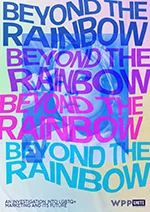 |
| Curtis Sparrer |
As communications and PR professionals, we are acutely aware of our personal and professional images. We understand that it takes only one wrong tweet or bad article to lead to disastrous situations for us individually and for the brands we represent.
This self-awareness and concern have forced many of us to toe the line by conforming to industry "non-DEI" etiquette. Whether it's a PR firm deciding to send "booth babes" to trade shows or deliberately curating a conversation with a client only to discuss neutral topics such as sports and weather, upholding the right image has always been the name of our game.
What a Heavy Load to Lift, Right?
I understand this daunting burden as a gay owner of a technology PR and communications firm married to a man. Perhaps the most insulting moment came earlier in my career when a client got all Brave New World on me and drunkenly told me that as a gay man, it was my role as a "Beta" to support "Alphas" like him. I should have been sassy and snapped, "I thought we were all Alphas." Instead, I was complicit by just laughing and letting the client have the last word.
The PR industry welcomes Diversity, Equity, and Inclusion (DEI), but, unfortunately, it does not exist in a vacuum. It connects to everything that matters for some companies, including facets that are not as rainbow friendly. That becomes a bigger deal in tech PR, where certain aspects of PR connect to programmers and developers. The tech scene has an infamous "brogrammer" culture that excludes women, people of color and LGBTQ folk. There are efforts underway to make the tech scene's developer culture more accessible via organizations like Girls Who Code and Black Girls Code—but the very existence of those organizations proves that more work is needed.
Life's Adversities Do Turn Into Professional Gold
Instead of being full of hate for how I was treated in my youth and as a young professional who was part of the LGBTQ+ community, I decided to turn that mistreatment into goodness. I knew I had to create a technology PR and marketing firm that stood up for marginalized employees internally and for external human rights and social justice initiatives.
That resulted in Bospar, a firm that goes beyond just hiring LGBTQ+ individuals; it also accepts employees from every religion, race, socioeconomic background, and, most shockingly, both Republicans and Democrats. In addition, it is an agency that employs people of every age and does away with prejudice against people with disabilities.
Lead by Dignified Example, and Even Naysayers Will Follow
It is sad but true: individuals and businesses worldwide tend to fear being the "first" to stand up for human rights and social justice causes. Yet when they see others making the changes and financially flourishing, they will stand up proudly and make the necessary changes.
For example, when Texas enacted its restrictive abortion legislation, Bospar was the first to offer to cover our Texas staff's relocation expenses of up to $10,000 if they wanted to move to a state allowing more autonomy over their reproductive health. By the end of the week, Salesforce announced a similar program. Since then, Citibank, Uber and several other "big brands" followed suit.
When it comes to LGBTQ+ rights, we are just as self-interested. Not only does our muscle memory from PR start with many of us coming out, but we see similarities between queer people who are disrupting the status quo and technology companies disrupting legacy paradigms of doing business the old-fashioned way. Our reputation for this approach even led leaders of San Francisco Pride to ask us to lead their communications program for the first actual Pride march since the pandemic.
I end with this—a not-so-dirty secret I have learned being in the industry for two decades. No matter how straight or skinny or colorless you try to pass yourself off as; it does not guarantee professional success. Remember, business is still business; many other points are the final deciding factors.
With this in mind, challenge those who try to dictate your professional and personal narrative, in a dignified and compassionate way that leaves them no choice but to embrace your redefined path. Standing up for your beliefs and creating your professional image are not mutually exclusive – think of it as your unique brand that makes you an even stronger communications or PR pro. Speaking from experience, I guarantee this works!
***
Curtis Sparrer is co-Founder and Principal at Bospar.


 LGBTQ+ representation in communications is getting better, but many brands are still lagging when it comes to making a year-round commitment, according to a report from WPP Unite.
LGBTQ+ representation in communications is getting better, but many brands are still lagging when it comes to making a year-round commitment, according to a report from WPP Unite. To effectively connect with the LGBTQ+ community, agencies need to build cultures that create equity-minded teams and bring that mindset to the work they deliver for clients.
To effectively connect with the LGBTQ+ community, agencies need to build cultures that create equity-minded teams and bring that mindset to the work they deliver for clients.  An ever-larger number of companies and organizations are using Pride Month to proclaim how LGBTQ-friendly or supportive they are—but how can ethical companies or organizations really show their commitment to meeting the needs and expectations of LGBTQ audiences?
An ever-larger number of companies and organizations are using Pride Month to proclaim how LGBTQ-friendly or supportive they are—but how can ethical companies or organizations really show their commitment to meeting the needs and expectations of LGBTQ audiences? There are ways that we as communicators can work to prevent backsliding on the deeply important issue of LGBTQ+ rights. Here are five of them.
There are ways that we as communicators can work to prevent backsliding on the deeply important issue of LGBTQ+ rights. Here are five of them. The economic comeback from the COVID-19 pandemic will likely be led by the LGBTQ consumer.
The economic comeback from the COVID-19 pandemic will likely be led by the LGBTQ consumer.


 Have a comment? Send it to
Have a comment? Send it to 
No comments have been submitted for this story yet.